It began with a chance conversation between M S Ravindra, his wife Nagaratna Ravindra, and their relative Malathi Sharma in 2009. Ravindra had recently quit his job at General Mills and taken to agriculture full-time, while Nagaratna and Malathi were working their full-time jobs in Bengaluru. During this conversation, Ravindra spoke of his travels around India while working for General Mills, reminiscing about missing his native Sankethi cuisine (from South-Western Karnataka) and expressing his desire to take this unique culinary tradition to the world.
“As fate would have it, my aunt (Malathi) and parents (Ravindra and Nagaratna) came up with the idea of using my grandmother’s traditional rasam powder recipe to make small batches in a 10×10 square feet room and distribute it to family and friends. This was their ‘aha’ moment, and the rest, as they say, is history,” says Bharat Kaushik, director and CEO of Adukale, speaking to The Better India.
To the uninitiated, Adukale is a leading ready-to-cook (RTC) and ready-to-eat (RTE) brand that reflects the rich heritage of Sankethi cuisine.
“Adukale was born out of sheer love and passion to bring time-tested Sankethi recipes to the fore. We gained significant popularity through word-of-mouth, owing to the immense popularity and demand for homegrown recipes. We moved on to and gojjavalakki (prepared using thick beaten rice, rasam powder, jaggery, tamarind, salt and coconut), and subsequently opened our flagship store in Malleshwaram in 2018,” adds Bharat.
“What started as a chance encounter has now become a way of life for me,” says Malathi.
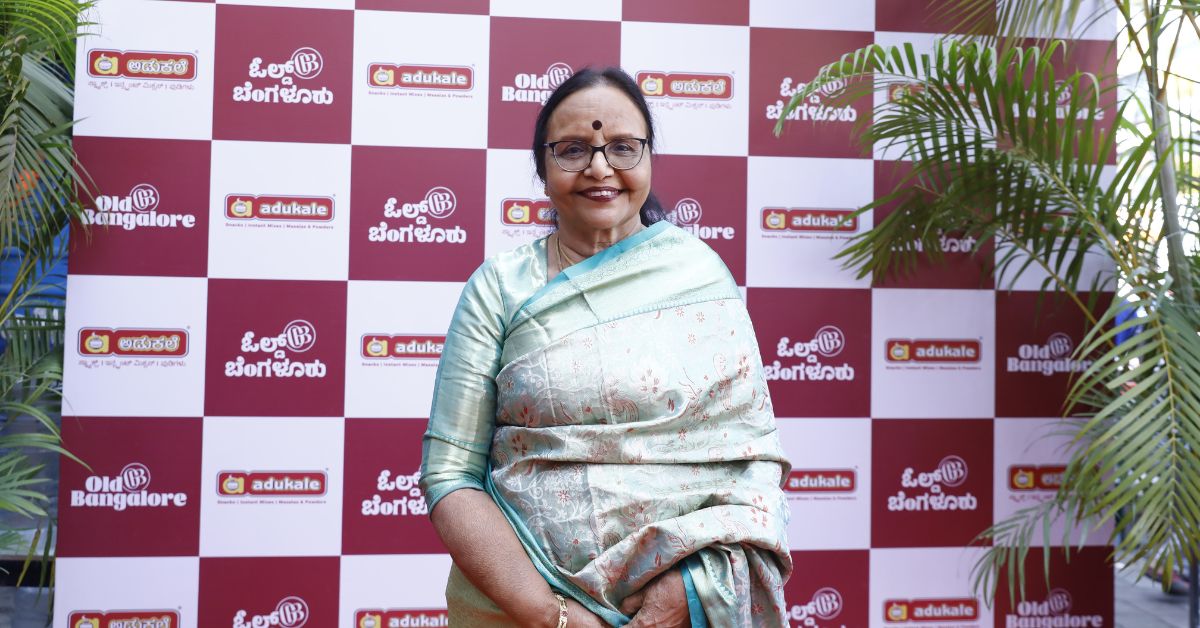
Malathi Sharma, co-founder of Adukale.
Before dwelling further into Adukale — which has grown from a 10×10 square feet room to a business that, this financial year, is slated to generate revenues of about (USD) $2 million (approx Rs 16.6 crore) — it’s imperative to gauge a better understanding of the Sankethi people and their cuisine.
According to a January 2011 article in The Hindu by C N Ramachandran, “The Sanketi [Sankethi] community is a small sub-sect of Smartha Brahmins, about 25,000 people who migrated from Southern Tamil Nadu, a few centuries ago. They are found mostly in old Mysuru state (especially in the neighbourhood of Kaveri and Tunga rivers), and, traditionally, they are noted for agriculture, study of the Vedas, and classical music.”
“They speak a dialect which has freely borrowed words and grammatical structures from Kannada, Malayalam, and Tulu, besides retaining certain Tamil elements,” adds Ramachandran.
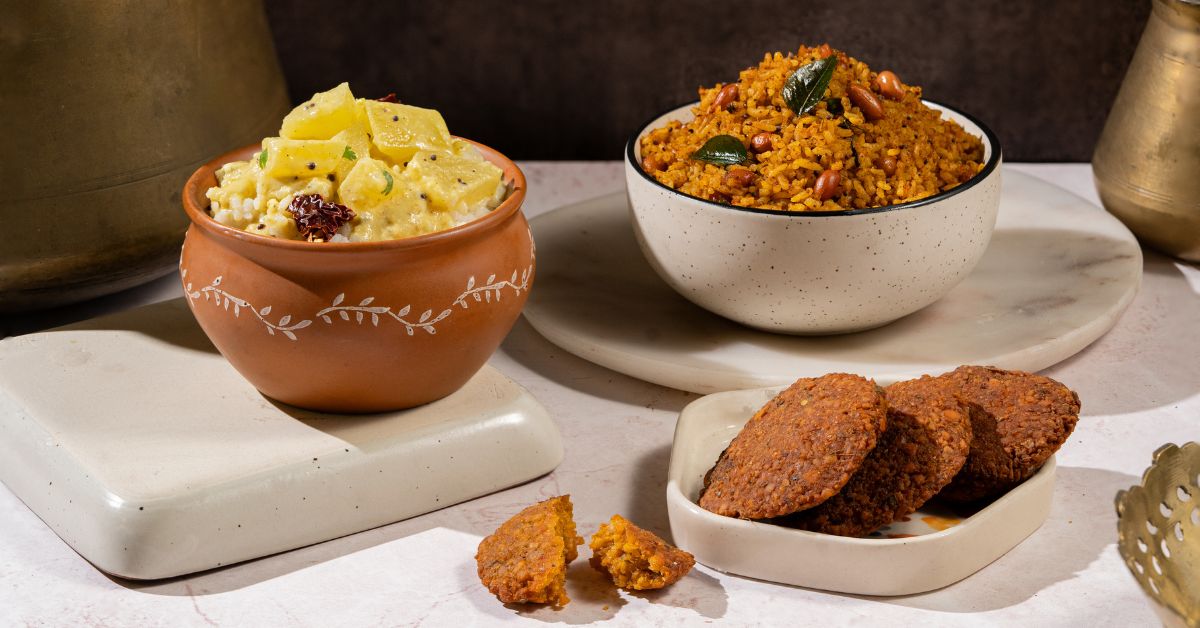
Puliyogare (tamarind rice), ambode (a type of vada), and majjige huli (yogurt and vegetable-based curry).
On the subject of Sankethi cuisine, however, Bharat tells The Better India, “Sankethi cuisine is an eclectic blend of cultures and tastes from three diverse states — Karnataka, Tamil Nadu, and Kerala. The cuisine is known for dishes that are light on the palette, flavourful, and packed with nutritional wellness. The mainstay of this cuisine is characterised by the use of local ingredients, techniques, and authentic flavour profiles.”
What makes Sankethi cuisine fascinating is the use of a variety of grains, lentils, vegetables, and spices, reflecting the agricultural abundance of their regions.
“The beauty of Sankethi cuisine lies in its rich diversity. While the recipes across households may share a common foundation, each final dish carries its own unique essence. Whether it’s a hint of jaggery or a touch of asafoetida, perhaps some zesty tamarind for an added kick, it’s these subtle variations that distinguish one household’s creation from another. It is the minute intricacies like the proportion of spices, duration, and temperature of roasting, and when they are removed from the flame, that contribute to robust flavours that infuse the cuisine with distinctive tastes, showcasing the unique selling point of the region,” explains Bharat.
Even with powders, every household crafts a distinctive signature flavour, argues Bharat. As he elaborates further, “This is a testament to the subtle techniques and personal touch that lend an edge to our products.”
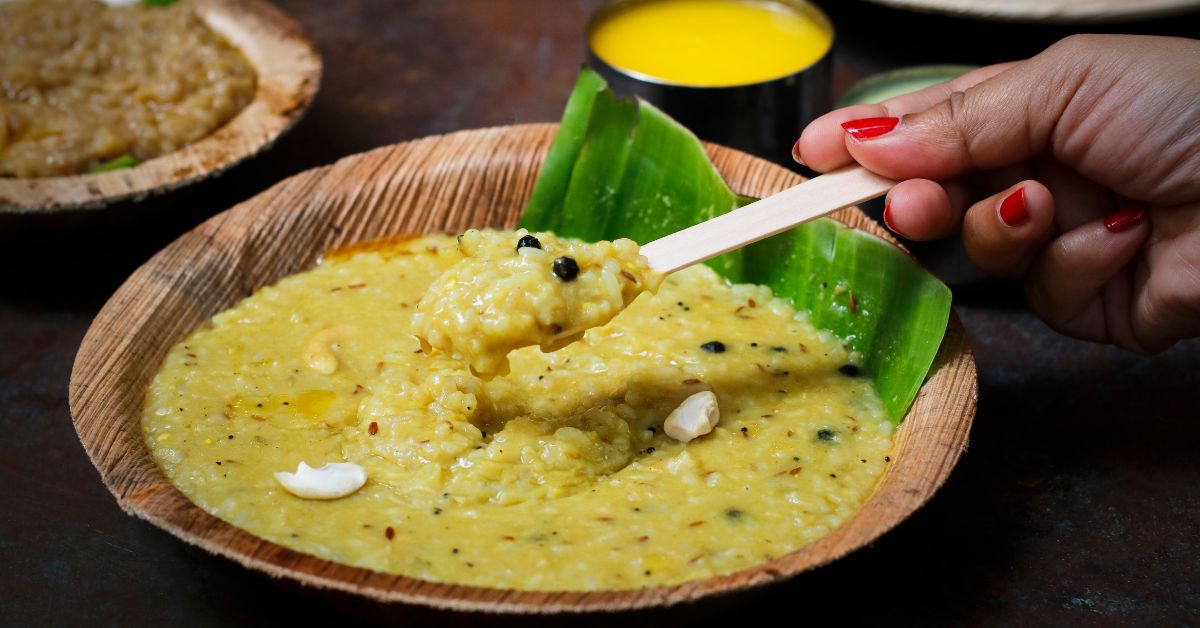
Pongal (A porridge made using rice, lentils and spices)
In a June 2019 interview with YourStory, Nagarathna, the co-founder of Adukale said, “We were guided by my mother-in-law’s principles when it came to cooking. The ingredients would be freshly ground and powdered without the addition of any preservatives.”
When asked by The Better India about what these principles of cooking were, Bharat notes, “We use our for cooking, and she was driven by intuition and decades of experience in the kitchen. She used to eyeball spices like dhaniya (coriander) and measure it by a fistful (she had a small fist). Spices like cinnamon were measured by the length of her fingers.”
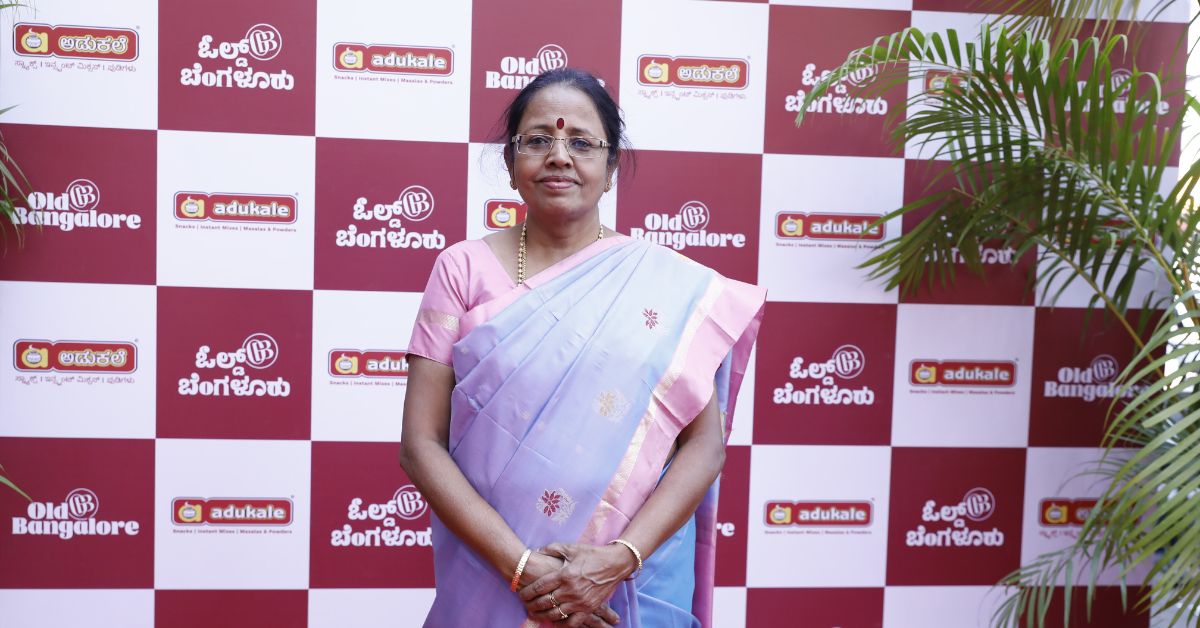
Nagaratna Ravindra, co-founder and director.
“Building on her foundation, my parents then added some methods to this by using a weighing scale to get precise measurements of the ingredients. This method has since become standardised across all our offerings, allowing us to consistently deliver a taste that resonates the warmth and affection of food that is cooked with love,” he adds.
To ensure optimal shelf life, Adukale claims to “meticulously roast” all other products at the ideal temperature. “Additionally, we incorporate natural preservatives, such as salt, tamarind, and lemon, into our recipes. These carefully chosen ingredients not only enhance flavour profiles but also contribute to prolonging the freshness of our products,” adds Bharat.
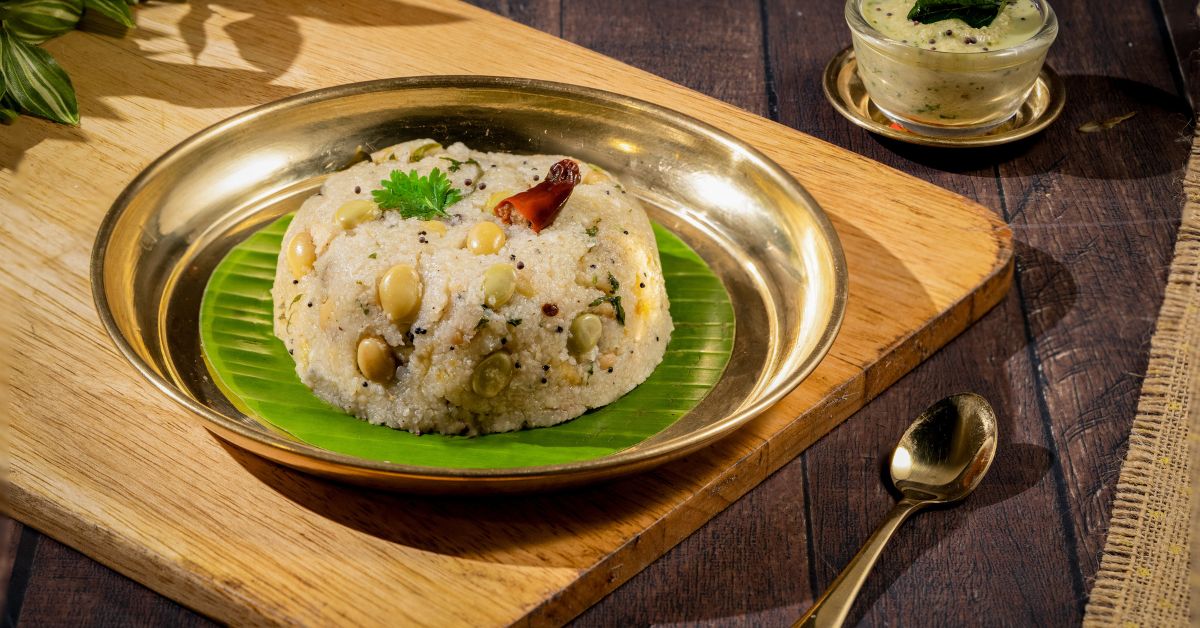
Avarekalu uppittu (Rava-based upma using hyacinth beans).
“During the inception [of Adukale], it was heartening to watch my parents and aunt bring in their entrepreneurial prowess and passion to the brand,” recalls Bharat.
Barely a few years after establishing Adukale, demand for their products grew so extensively in Bengaluru through just word of mouth that they were compelled to move away from their small 10×10 square feet room in Malathi’s home to a 3,000 sq ft facility with a capacity of 30 tonnes. In 2018, the venture shifted to an even larger 7,000 sq ft facility in South Bengaluru with a capacity of 100 tonnes.
Despite their capacity growing multi-fold, their processes didn’t change. One of the three founding partners of the business continued to supervise each stage of production to ensure product quality didn’t wane. What also helped was Bharat joining the business in 2017.
Bharat recalls, “Witnessing great promise in the venture, I quit my profession as a software engineer in the US to join Adukale. As someone passionate about food and the culinary landscape, I wanted to bring in my global experience and innovation to scale the brand and make strides in .”
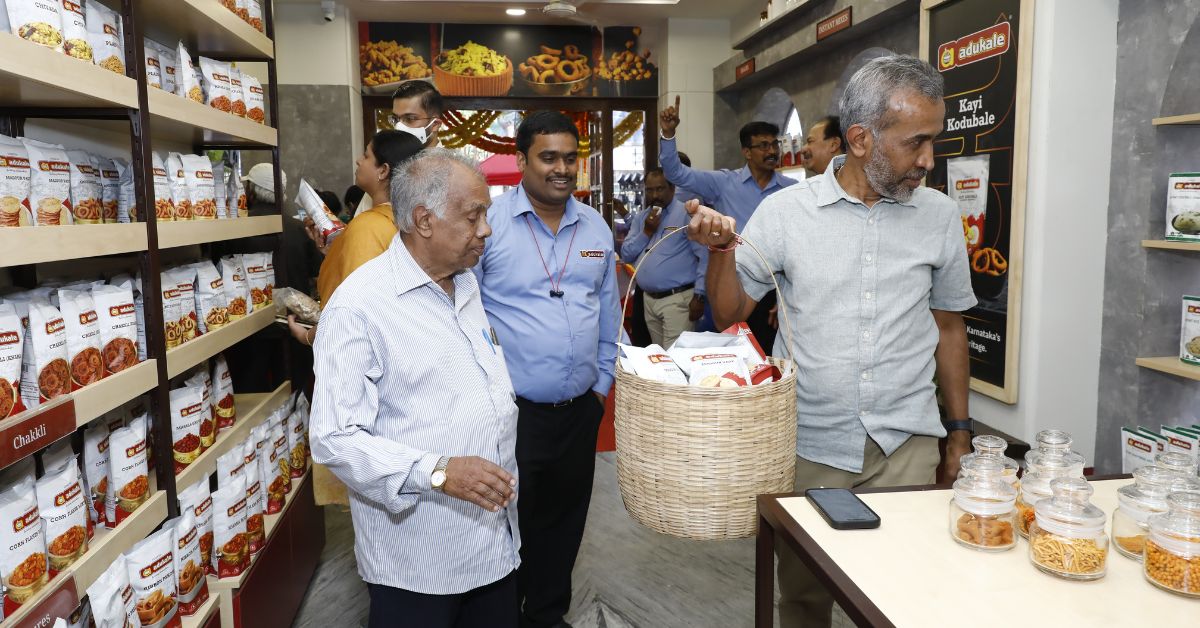
At an Adukale outlet in Old Bengaluru.
But does the expansion of the brand necessitate breaking away from your Sankethi roots on the odd occasion? Bharat doesn’t seem to agree, saying, “Adukale has always been a Karnataka brand; our roots are deeply embedded in the culinary heritage of the region. Similar to national brands, our products have their own USP — a key growth factor in the markets we operate.”
He adds, “Thanks to social media, the world is our platter and cross-border integration of food has never been better. People thrive on homegrown recipes and products that are a window to different cultures. Given this background, our core will always remain the same.”
After joining Adukale in 2017, Bharat became director in 2019, and subsequently the CEO in 2021.
Currently, Adukale enjoys an extensive selection of 56 products, available across 20 stores throughout Bengaluru and Mysuru. “Additionally, we’ve established a strong online presence, ensuring our offerings are accessible to customers far and wide. As Adukale continues to grow and expand its reach, it remains rooted in its core mission of , one delicious product at a time,” he says.
Their range of products currently comprises RTE foods like poha, upma, gojjavalakki, and bisi bele bath (a spicy, rice-based dish), blended spices like chutney powders, sambar powder, tarkaari gojjina powder (spice mix to prepare gojju), and namkeens or savouries like nippattu (crispy deep fried rice crackers) and kayi kodubale (a popular deep-fried snack from Karnataka made using rice flour, coconut, ground roasted gram powder).
According to Bharat, these products are free of preservatives and artificial colours. Also, with millets making a comeback in Indian households as superfoods, Adukale has also launched millet-based RTC products like the ‘Instant Millets Dose [Dosa] Mix’, amongst others.
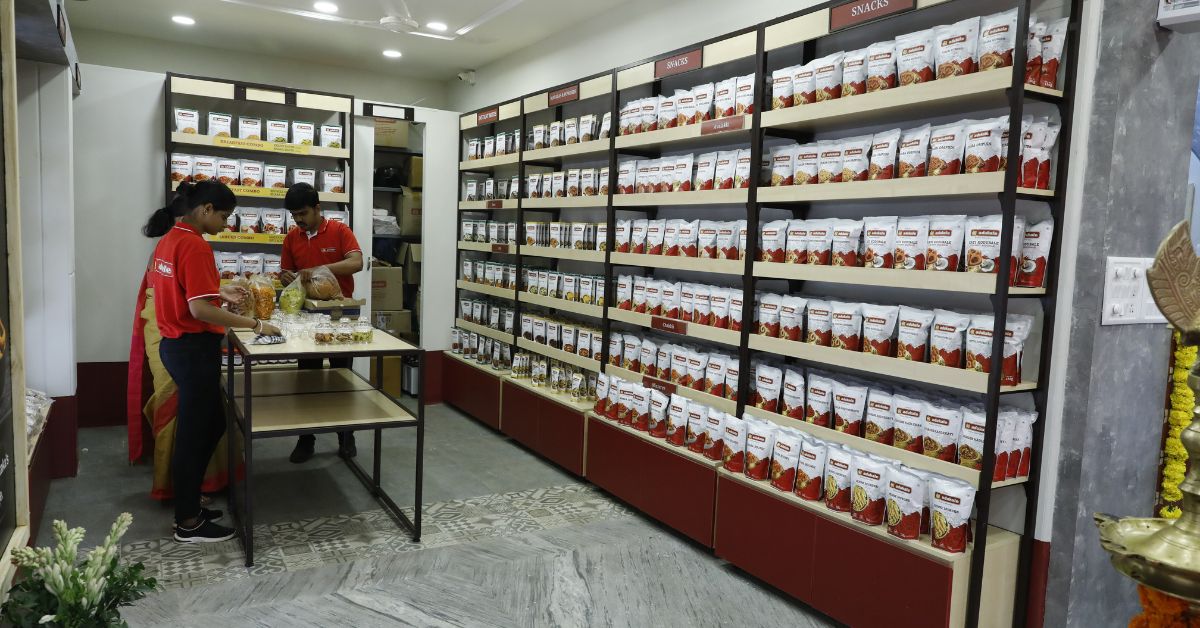
At another Adukale outlet in Bengaluru.
According to a November 2022 report by Allied Market Research, the India ready-to-eat (RTE) and ready-to-cook (RTC) food market was valued at $557.6 million in 2021, and is projected to reach $2,861.3 million by 2031, registering a CAGR of 17.6% from 2022 to 2031.
How does Adukale compete with big brands like Maiya’s and MTR? “Our product range is defined by authenticity and freshness. While we are growing as a brand, our focus will remain on mastering traditional Karnataka food. This gives us a first-mover advantage in the category. Over the years, the Sankethi community has found a sweet spot in Karnataka, and we are honoured to play a role in taking the Karnataka culinary legacy forward,” says Bharat.
As M S Ravindra notes, “We take great pride in building a community of food lovers through Adukale. Our focus on the highest standards of quality, flavours, and authenticity has played an integral role in pivoting from a small room to a celebrated brand in Karnataka’s F&B industry.”
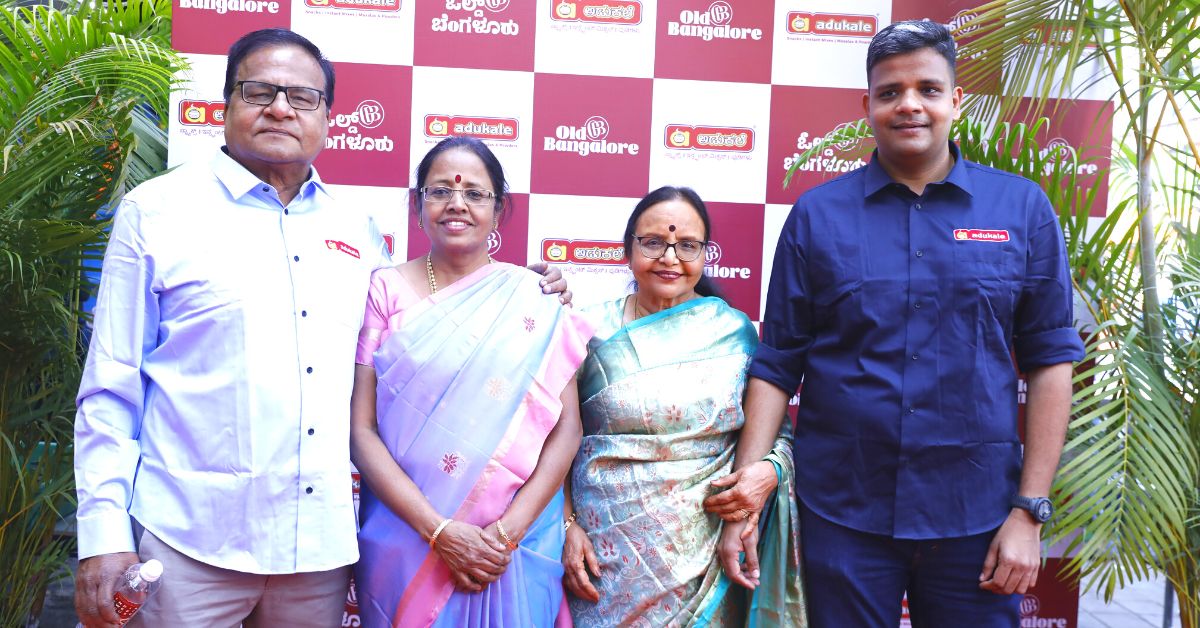
(L-R) M S Ravindra – director, Nagaratna- director, Malathi Sharma – director, and Bharat Kaushik – director and CEO of Adukale.
As of today, Adukale has 18 experience stores in Bengaluru and two in Mysuru, with ambitious plans to expand to 30 stores across Karnataka in the upcoming year.
“Our growth trajectory is evident from our March 2024 closing revenues, which stood at approximately USD 2 million, reflecting a consistent doubling of our revenues over the past few years. With a substantial customer base, we also recognise the immense potential of the international market. Currently exporting to the US and Australia, we are eager to tap into additional markets worldwide. Our bullish outlook on international expansion highlights our commitment to sharing authentic flavours of Karnataka with a global audience,” claims Bharat.
(If you want to find out more about Adukale, you can visit their website .)
(Edited by Pranita Bhat; Images courtesy Adukale)
“As fate would have it, my aunt (Malathi) and parents (Ravindra and Nagaratna) came up with the idea of using my grandmother’s traditional rasam powder recipe to make small batches in a 10×10 square feet room and distribute it to family and friends. This was their ‘aha’ moment, and the rest, as they say, is history,” says Bharat Kaushik, director and CEO of Adukale, speaking to The Better India.
To the uninitiated, Adukale is a leading ready-to-cook (RTC) and ready-to-eat (RTE) brand that reflects the rich heritage of Sankethi cuisine.
“Adukale was born out of sheer love and passion to bring time-tested Sankethi recipes to the fore. We gained significant popularity through word-of-mouth, owing to the immense popularity and demand for homegrown recipes. We moved on to and gojjavalakki (prepared using thick beaten rice, rasam powder, jaggery, tamarind, salt and coconut), and subsequently opened our flagship store in Malleshwaram in 2018,” adds Bharat.
“What started as a chance encounter has now become a way of life for me,” says Malathi.

Malathi Sharma, co-founder of Adukale.
Understanding Sankethi cuisine
Before dwelling further into Adukale — which has grown from a 10×10 square feet room to a business that, this financial year, is slated to generate revenues of about (USD) $2 million (approx Rs 16.6 crore) — it’s imperative to gauge a better understanding of the Sankethi people and their cuisine.
According to a January 2011 article in The Hindu by C N Ramachandran, “The Sanketi [Sankethi] community is a small sub-sect of Smartha Brahmins, about 25,000 people who migrated from Southern Tamil Nadu, a few centuries ago. They are found mostly in old Mysuru state (especially in the neighbourhood of Kaveri and Tunga rivers), and, traditionally, they are noted for agriculture, study of the Vedas, and classical music.”
“They speak a dialect which has freely borrowed words and grammatical structures from Kannada, Malayalam, and Tulu, besides retaining certain Tamil elements,” adds Ramachandran.

Puliyogare (tamarind rice), ambode (a type of vada), and majjige huli (yogurt and vegetable-based curry).
On the subject of Sankethi cuisine, however, Bharat tells The Better India, “Sankethi cuisine is an eclectic blend of cultures and tastes from three diverse states — Karnataka, Tamil Nadu, and Kerala. The cuisine is known for dishes that are light on the palette, flavourful, and packed with nutritional wellness. The mainstay of this cuisine is characterised by the use of local ingredients, techniques, and authentic flavour profiles.”
What makes Sankethi cuisine fascinating is the use of a variety of grains, lentils, vegetables, and spices, reflecting the agricultural abundance of their regions.
“The beauty of Sankethi cuisine lies in its rich diversity. While the recipes across households may share a common foundation, each final dish carries its own unique essence. Whether it’s a hint of jaggery or a touch of asafoetida, perhaps some zesty tamarind for an added kick, it’s these subtle variations that distinguish one household’s creation from another. It is the minute intricacies like the proportion of spices, duration, and temperature of roasting, and when they are removed from the flame, that contribute to robust flavours that infuse the cuisine with distinctive tastes, showcasing the unique selling point of the region,” explains Bharat.
Even with powders, every household crafts a distinctive signature flavour, argues Bharat. As he elaborates further, “This is a testament to the subtle techniques and personal touch that lend an edge to our products.”

Pongal (A porridge made using rice, lentils and spices)
In a June 2019 interview with YourStory, Nagarathna, the co-founder of Adukale said, “We were guided by my mother-in-law’s principles when it came to cooking. The ingredients would be freshly ground and powdered without the addition of any preservatives.”
When asked by The Better India about what these principles of cooking were, Bharat notes, “We use our for cooking, and she was driven by intuition and decades of experience in the kitchen. She used to eyeball spices like dhaniya (coriander) and measure it by a fistful (she had a small fist). Spices like cinnamon were measured by the length of her fingers.”

Nagaratna Ravindra, co-founder and director.
“Building on her foundation, my parents then added some methods to this by using a weighing scale to get precise measurements of the ingredients. This method has since become standardised across all our offerings, allowing us to consistently deliver a taste that resonates the warmth and affection of food that is cooked with love,” he adds.
To ensure optimal shelf life, Adukale claims to “meticulously roast” all other products at the ideal temperature. “Additionally, we incorporate natural preservatives, such as salt, tamarind, and lemon, into our recipes. These carefully chosen ingredients not only enhance flavour profiles but also contribute to prolonging the freshness of our products,” adds Bharat.

Avarekalu uppittu (Rava-based upma using hyacinth beans).
Bringing the magic of Sankethi cuisine to the Indian market
“During the inception [of Adukale], it was heartening to watch my parents and aunt bring in their entrepreneurial prowess and passion to the brand,” recalls Bharat.
Barely a few years after establishing Adukale, demand for their products grew so extensively in Bengaluru through just word of mouth that they were compelled to move away from their small 10×10 square feet room in Malathi’s home to a 3,000 sq ft facility with a capacity of 30 tonnes. In 2018, the venture shifted to an even larger 7,000 sq ft facility in South Bengaluru with a capacity of 100 tonnes.
Despite their capacity growing multi-fold, their processes didn’t change. One of the three founding partners of the business continued to supervise each stage of production to ensure product quality didn’t wane. What also helped was Bharat joining the business in 2017.
Bharat recalls, “Witnessing great promise in the venture, I quit my profession as a software engineer in the US to join Adukale. As someone passionate about food and the culinary landscape, I wanted to bring in my global experience and innovation to scale the brand and make strides in .”

At an Adukale outlet in Old Bengaluru.
But does the expansion of the brand necessitate breaking away from your Sankethi roots on the odd occasion? Bharat doesn’t seem to agree, saying, “Adukale has always been a Karnataka brand; our roots are deeply embedded in the culinary heritage of the region. Similar to national brands, our products have their own USP — a key growth factor in the markets we operate.”
He adds, “Thanks to social media, the world is our platter and cross-border integration of food has never been better. People thrive on homegrown recipes and products that are a window to different cultures. Given this background, our core will always remain the same.”
After joining Adukale in 2017, Bharat became director in 2019, and subsequently the CEO in 2021.
Currently, Adukale enjoys an extensive selection of 56 products, available across 20 stores throughout Bengaluru and Mysuru. “Additionally, we’ve established a strong online presence, ensuring our offerings are accessible to customers far and wide. As Adukale continues to grow and expand its reach, it remains rooted in its core mission of , one delicious product at a time,” he says.
Their range of products currently comprises RTE foods like poha, upma, gojjavalakki, and bisi bele bath (a spicy, rice-based dish), blended spices like chutney powders, sambar powder, tarkaari gojjina powder (spice mix to prepare gojju), and namkeens or savouries like nippattu (crispy deep fried rice crackers) and kayi kodubale (a popular deep-fried snack from Karnataka made using rice flour, coconut, ground roasted gram powder).
According to Bharat, these products are free of preservatives and artificial colours. Also, with millets making a comeback in Indian households as superfoods, Adukale has also launched millet-based RTC products like the ‘Instant Millets Dose [Dosa] Mix’, amongst others.

At another Adukale outlet in Bengaluru.
Expanding their market reach
According to a November 2022 report by Allied Market Research, the India ready-to-eat (RTE) and ready-to-cook (RTC) food market was valued at $557.6 million in 2021, and is projected to reach $2,861.3 million by 2031, registering a CAGR of 17.6% from 2022 to 2031.
How does Adukale compete with big brands like Maiya’s and MTR? “Our product range is defined by authenticity and freshness. While we are growing as a brand, our focus will remain on mastering traditional Karnataka food. This gives us a first-mover advantage in the category. Over the years, the Sankethi community has found a sweet spot in Karnataka, and we are honoured to play a role in taking the Karnataka culinary legacy forward,” says Bharat.
As M S Ravindra notes, “We take great pride in building a community of food lovers through Adukale. Our focus on the highest standards of quality, flavours, and authenticity has played an integral role in pivoting from a small room to a celebrated brand in Karnataka’s F&B industry.”

(L-R) M S Ravindra – director, Nagaratna- director, Malathi Sharma – director, and Bharat Kaushik – director and CEO of Adukale.
As of today, Adukale has 18 experience stores in Bengaluru and two in Mysuru, with ambitious plans to expand to 30 stores across Karnataka in the upcoming year.
“Our growth trajectory is evident from our March 2024 closing revenues, which stood at approximately USD 2 million, reflecting a consistent doubling of our revenues over the past few years. With a substantial customer base, we also recognise the immense potential of the international market. Currently exporting to the US and Australia, we are eager to tap into additional markets worldwide. Our bullish outlook on international expansion highlights our commitment to sharing authentic flavours of Karnataka with a global audience,” claims Bharat.
(If you want to find out more about Adukale, you can visit their website .)
(Edited by Pranita Bhat; Images courtesy Adukale)
